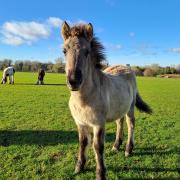Where were the pleasure gardens of Norwich and why are cucumbers posh? Meet the man behind the illustrated blog and books delving into some of the quirkier corners of Norfolk history.
Just about every street is packed with stories reaching back through the centuries – and Colonel Reggie Unthank has spent years finding them behind handsome doorways, intriguingly-named roads or mysteriously-worded memorials.
The Colonel has hunted down the city centre site of Sir Thomas Browne’s garden, described as ‘a paradise’ in 1671, and of the telegraph stations which, more than 200 years ago, meant messages could be sent from Great Yarmouth to London in just 17 minutes.
His first mission gave him his name.
The man behind the Colonel is Clive Lloyd, who arrived in Norwich in 1982 to work as a plant scientist at the John Innes Centre.

He moved into a house in Unthank Road and became fascinated by the history of the area.
Clive insists he is not a historian, although the evidence of his impeccably-researched investigations suggests otherwise. He is definitely a gifted communicator, distilling weeks of research into beautifully illustrated pieces on, say, the bronze doors of City Hall (with diversions to chocolate factories, the Vikings and the world’s first wine-in-a-box.)
‘I prefer to take a sideways look at things I come across as I wander about town – preferably off the beaten path,’ he says at the top of his popular Colonel Unthank’s Norwich blog.
Word on his new street was that an extra tall section of wall at a junction was the last vestige of the Unthank estate, from which the road took its name. As he searched for the facts behind the tall wall story, Clive uncovered a tale of love at the heart of Norwich’s Golden Triangle, and the real reason for the wall.
Three generations of the Unthank family were colonels, and from 2015 there was a fourth colonel on the Unthank Road – who discovered that the high wall which had first inspired him was not an Unthank thing at all. But by then he was enjoying researching history around the county.

His many enthusiasms include angels in medieval churches, the Arts and Crafts movement, Norfolk architects and local brickwork, ironwork and flint.
As a scientist Clive wrote papers on how the components of plant cells work. ‘I soon realised no-one likes to scroll through a whole page of text,’ he said. When he began writing as Colonel Unthank (adopting a pen name to keep a distance between himself and his historical investigator) he used the same lots-of-pictures policy.
‘Science is telling stories. I always liked writing papers that explained science and it was always the writing I enjoyed,’ said Clive.
The audience for the Colonel’s entertaining, accessible and meticulously researched investigations grew steadily as Clive discovered that the quirky statues, handsome terraced streets and old maps which piqued his attention, interested thousands of other people too.
He identified the people portrayed in terracotta panels on the outside of Jarrolds and, now living off Eaton Road in Norwich, became intrigued by the glass that people found in their gardens and wrote about the nursery fields of Eaton – which were once packed with glasshouses.
Before such nurseries were developed some crops were limited to lavish estates. ‘It’s why cucumber sandwiches are still considered posh,’ said Clive. ‘Cucumbers were very exotic. You were showing your wealth, that you had your own hot house with your own gardener who produced cucumbers, tomatoes, pineapples...’

Clive grew up in a mining village in South Wales. His grandfather was killed in a mining accident and his father, as the eldest of 10 bereft children, was employed to hand out lamps as workers descended into the mines. Clive took a very different route, studying biochemistry at university and going on to specialise in plant cells.
Plants still play an important part in his life, but in the garden rather than under the microscope. His wife, Sue, adores gardening and has an OBE for her work planting neighbourhood woods with the Woodland Trust. They produce twice-yearly magazines for the Norfolk Gardens Trust and, with 10 grandchildren between them, Clive is working on a children's book set in historic Norwich.
And as Colonel Unthank he has unearthed the stories of pleasure gardens, complete with waterfalls, fireworks and balloon flights, which once graced Norwich city centre.
Clive’s latest book is Back Stories, Further Adventures in Colonel Unthank’s Norwich. He has also written Colonel Unthank and the Golden Triangle, and Colonel Unthank’s Norwich, a Sideways Look at the City, and blogs about the history, decorative arts and buildings of the city at colonelunthanksnorwich.com



























